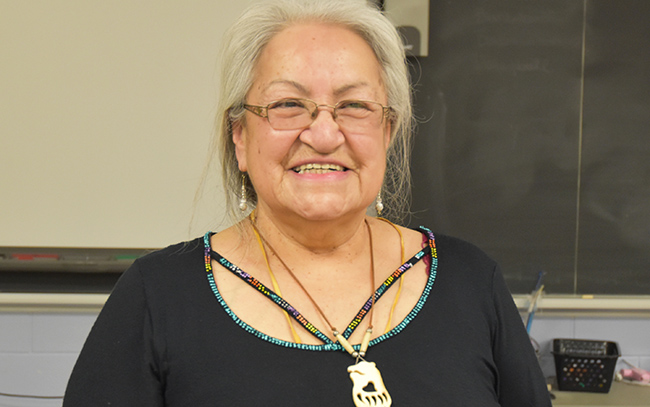First Nations beware of human traffickers

By Kelly Anne Smith
NIPISSING FIRST NATION – Young women thrown overboard Great Lake ships after sexual abuse. Women trapped in relationships. Gangs targeting vulnerable children for prostitution. Sexual slavery through immigration entrapment.
Horrible stories were told during the presentation on human trafficking recently at Nbisiing Secondary School.
Isabel Meawasige led the presentation. She is intent on stopping the horrible crimes of sexual exploitation committed against vulnerable youth.
Isabel Meawasige gave a presentation based on one developed by Project Impact Ottawa. “Whether or not you believe it, it’s here.”
Meawasige is a social worker from Serpent River First Nation who is passionate about reaching as many citizen’s from as many First Nations as possible with her presentations.
“But it happens with a steady, slower pace. We are working with grandmother energy.” And sure enough, we were a room of grandmothers in attendance.
Except for Grandfather George Couchie, sitting beside Grandmother Carolyn Couchie. She is the Executive Director of Victim Services of Nipissing. The Couchie’s know that human trafficking is going on all around us in our area. George Couchie is a retired OPP officer who informed the gathering that Sudbury has just announced an officer will be hired full time to be devoted to human trafficking.
Carolyn Couchie has interacted with victims of human trafficking. “The ad goes up. They move them into North Bay. They might be here two or three nights in motels in North Bay. Then they are pushed up through New Liskeard, Timmins, Cochrane, Kapuskasing, Hearst then over to Sudbury and through Algoma. They move them though the northern circuit.”
Almost half of the regions social service providers have encountered victims of human trafficking in their work.
Carolyn Couchie explained it is evident from ads that younger girls are more popular amongst Johns or the clients of prostitutes. Couchie calls them consumers. “We have to stop them. They are living amongst us in our neighbourhoods.”
If you see it you can do something about it. When you check yourself into a hotel, you’re looking. People can be more aware. Cab drivers would obviously know if they are transporting victims. Then there are buses, trains, and flight attendants on planes. They know how to identify and they have rescued girls.”
Elder Dot Beaucage-Kennedy voiced the same opinion. She suggested that all eyes be open to catch any wrongdoing in Nipissing First Nation.
Social worker Isabel Meawasige says girls for years have been put into an identity box by western society. They are supposed to be weak and boy’s masculine. “Girls get programmed as weak and at risk to be targeted for abduction or entrapment.”
Meawasige says that after the child is exploited, and sometimes repeatedly raped, they are broken. “It takes a lot to deprogram them. After being rescued, victims need PTSD therapy.”
She cautions adults and youth to be aware of the dangers. “Girls looking for adventure might not know the danger that awaits in a ride with someone they barely know.”
Meawasige says she will travel to any community to talk. “I’ll keep talking until I’m blue in the face. We want to stop our girls from going out there and being so vulnerable. Hold on to those girls.”
Beaucage-Kennedy offered smudge at the events closing. “What we talked about is so negative. We don’t take that home.”
1-855-554-HEAL is a 24-hr counselling service for Indigenous women. http://www.talk4healing.com/
1-855-242-3310 is a Bell Let’s Talk service in Ojibway, Cree, Inuktitut, French and English.


